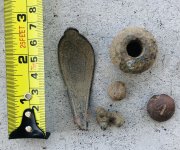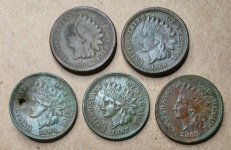I realized I am in an ideal spot to try this, but am curious if others have done so, and what their results were?
I was thinking about doing a phyromining experiment upon my farm this year. I believe I am in an excellent location for this. I have gold bearing bedrock, yet only a few inches above, I have some fertile soil. I was going to plant a few acres of sunflowers anyway, so treating the soil with a lixiviant just before harvest would not be a big deal. Naturally, being a sheep farm, I have the resources to produce that lixiviant as well.
My original intent was to harvest the heads for the seeds, and have the stems to be chopped for sheep fodder, but obviously I cannot do the latter if treated with lixiviant. I experimented this year with using corn mixed in my home-heating pellet stove with excellent results, so I thought this year I would experiment with burning sunflower seeds. Yet rather than use the stalks to feed my sheep, I would just burn the stalks and have the resulting ash assayed to see what the gold/Silver/PMG content was. We have grown sunflowers in the past with really good results, so I know sunflowers grow well here, it would just be interesting to see how much they hyperaccumulate gold/silver/pgm's. Really the only technical help I would need is figuring out how much lixiviant I would need to apply per acre to kickstart the hyperaccumulation process.
I do not know any farm in Maine who is doing this though, mostly because how much gold/silver/pgm areas are located under open farm land?
It would be an interesting experiment though, and while I doubt it would be a literal gold mine for me, it would be easier than hard rock mining (LOL).
It might be interesting to see how much remediation could happen to my farm's soils from the high levels of copper and zinc that have accumulated from liquid dairy cow manure applications too. That unto itself has high benefits for since it is such a problem for us farmers; especially sheep farmers! (Anything over 8 ppm in the feed will kill a sheep as they are very susceptible to copper toxicity).
Heat my home, rid my farm of toxic levels of heavy metals, and gathering up gold all at the same time; it is a very interesting concept.
I was thinking about doing a phyromining experiment upon my farm this year. I believe I am in an excellent location for this. I have gold bearing bedrock, yet only a few inches above, I have some fertile soil. I was going to plant a few acres of sunflowers anyway, so treating the soil with a lixiviant just before harvest would not be a big deal. Naturally, being a sheep farm, I have the resources to produce that lixiviant as well.
My original intent was to harvest the heads for the seeds, and have the stems to be chopped for sheep fodder, but obviously I cannot do the latter if treated with lixiviant. I experimented this year with using corn mixed in my home-heating pellet stove with excellent results, so I thought this year I would experiment with burning sunflower seeds. Yet rather than use the stalks to feed my sheep, I would just burn the stalks and have the resulting ash assayed to see what the gold/Silver/PMG content was. We have grown sunflowers in the past with really good results, so I know sunflowers grow well here, it would just be interesting to see how much they hyperaccumulate gold/silver/pgm's. Really the only technical help I would need is figuring out how much lixiviant I would need to apply per acre to kickstart the hyperaccumulation process.
I do not know any farm in Maine who is doing this though, mostly because how much gold/silver/pgm areas are located under open farm land?
It would be an interesting experiment though, and while I doubt it would be a literal gold mine for me, it would be easier than hard rock mining (LOL).
It might be interesting to see how much remediation could happen to my farm's soils from the high levels of copper and zinc that have accumulated from liquid dairy cow manure applications too. That unto itself has high benefits for since it is such a problem for us farmers; especially sheep farmers! (Anything over 8 ppm in the feed will kill a sheep as they are very susceptible to copper toxicity).
Heat my home, rid my farm of toxic levels of heavy metals, and gathering up gold all at the same time; it is a very interesting concept.
Amazon Forum Fav 👍
Upvote
0








